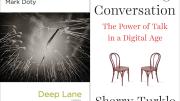writer Mark Doty and social psychologist Sherry Turkle will speak at this year’s Phi Beta Kappa (PBK) Literary Exercises, which will take place in Sanders Theatre on May 23. This is traditionally the opening event of Commencement week, and during it, the society confers honorary memberships and its undergraduates recognize outstanding faculty teachers.
Mark Doty, best known for his writing on bereavement and gay life, teaches at Rutgers. In addition to several volumes of poetry, he has also written two books of criticism (one on The Art of Description, the other inspired by a seventeenth-century Dutch still life) and three memoirs. The most recent, Dog Years, about the pets he adopted as companions for his dying partner, became a New York Times bestseller in 2007. In 1995, Doty became the first American poet to win the United Kingdom’s T.S. Eliot Prize, for My Alexandria, about the AIDS epidemic; in 2008, he won the National Book Award for a book of new and selected poems, Fire to Fire.
Soon after winning that prize, he began work on what would become the kernel of his most recent book, Deep Lane, named for a road near the cottage Doty bought in East Hampton, New York. The first poem he wrote there begins with an image of the speaker weeding the garden, and then “talking to the anvil of darkness,” recalling a friend’s suicide. “As soon as I finished it, I knew I was nowhere near done with Deep Lane, those two little monosyllables,” he told an interviewer. “It became a place to repeatedly go down.” In total, the collection contains nine “Deep Lane” poems, and addresses the lingering grief over past losses, as well as a newer one: the end of Doty’s second marriage. Calling him “an unusually generous poet,” Slate’s review of the book praised Doty’s “rare mix of abundance and clarity”: “If his poems are accessible (and they are, even if that term matters too much to too many), they are also bountiful, arched toward beauty in a desire for solace.”
Sherry Turkle ’69, Ph.D. ’76, is the founder and director of MIT’s Initiative on Technology and Self. At the Graduate School of Arts and Sciences—which awarded her its highest honor, the Centennial Medal, in 2013—she studied Freud and French revolutionary thought; her first book, published in 1978, was about French psychoanalysis. But around that time, she told The Guardian, “I began to hear students talking about their minds as machines, based on the early personal computers they had. They’d use phrases like ‘debugging’ or ‘Don't talk to me until I clear my buffer.’ I'd never heard any of this stuff before.”
In the decades since, Turkle has devoted her research to human behavior and the digital world. Her most recent and best-known books have explored the effect of technology on its users’ emotional lives. In Alone Together: Why We Expect More from Technology and Less from Each Other (2011), she argued that people were replacing human conversation with electronic communication, choosing the reliable comforts of social media over the commitments and risks of real-world community. She followed up with Reclaiming Conversation: The Power of Talk in a Digital Age (2015), which advocated possible remedies to what she considers twinned losses: empathy and solitude. Attendees may feel extra-compelled to pay this speaker special attention, undivided by their devices.
Check back for Harvard Magazine’s in-depth Commencement week coverage, May 23-26, here.









